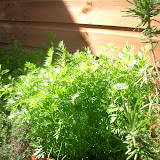Recently my partner won a wonderful thing, a year’s supply of organic eggs from Castel Farm. 6 eggs, every week for a year. 312 eggs. Wonderful for those who like eggs. I, however, don’t. It’s not a medical allergy, just a pathological aversion.
Clearly I’m going to have to challenge my petulant distain for the egg and embrace this as a culinary opportunity. It'll be good for me. I'd like to share the experience, though. Maybe not every soldier dunked and omelette flipped, but the highlights, the meringue islands floating giddily by, the frittatas packed with fresh veg’. The moments that convert me. One man and 312 eggs.
To aid me on this task I'm going to plunder the garden and hedgerows, allotment and sea for ingredients. These tawny shelled marvels demand decent ingredients. Whether they are playing a supporting bass note or the headline aria in a dish, I want these eggs to be married with the best local produce I can find.
Garlic, artichoke & eggs We claim no gardening expertise. As well as an account of my efforts to love the egg, this is also a record of our efforts to encourage edible stuff to grow. This year, through iffy planning, we've managed to extend the 'hunger gap', the period of time when the Winter crop has been eaten and the Summer veg has yet to come. The purple sprouting has given up its tight buds to exuberant yellow flowers, the kale has gone leggy and the cabbages have been finished off by slugs, wood pigeons and, occasionally, us. Broad beans may be swelling in pods, sweet corn stalks unfurling and runner beans scrambling up canes, but there is nothing yet to eat, bar garlic and artichokes.
The garlic is a wilted, leek rust scarred remnant of its former winter glory. Beneath the soil, though, nestle small, pungent white bullets, a crop perfect for using fresh, or 'wet'.
Our artichoke plants are glorious. Kindly given to us as cuttings by a fellow allotmenteer, the plants now tower over our small plot. Fat, succulent leaves sprawl out beneath thick stems that punch fist sized artichokes into the sky. We closely monitor the buds, as artichokes are best eaten as their lower petals start to open,
before the plant gets a chance to open thistle like flowers.
Garlic egg mayonnaise and whole artichokes The artichokes take a little prepping. Ours have become home to thousands of aphids, farmed by an attending multitude of ants. To purge the insects it is necessary to give
the artichokes a good soak in salted water. Rinse and repeat until the black bug slick dissipates.
Bring a large pan of salted water to the bowl and get a bowl of water with a squeeze of lemon in ready to drop the artichokes in as you prepare them. Slice away the top quarter of each artichoke and cut its stalk off close to the base. Put the artichokes into the pan, along with a squeeze of lemon and boil for 20 – 40 minutes, until the base is tender to a knife and the lower petals pull easily away. Drain, shake and serve.
While the artichokes soften you can whip up this quick mayonnaise. A silky, seductive concoction that appeals even to an egg adverse chap like me, this is ideal for dipping the artichoke’s tender petals in before stripping off the flesh with your teeth. All that is required is a strong whipping arm and patience.
The luxuriousness of the mayo soon quelled any residual reservations about eating raw egg. After an indulgent few minutes deconstructing the artichokes our table was strewn with chewed leaves and splashes of mayonnaise; I may yet be converted to the egg.
Egg Mayonnaise
300 ml good quality extra virgin olive oil
1 small garlic clove, crushed
2 large egg yolks
Squeeze of lemon
Handful of chopped dill
Salt
Pepper
Method
• Add the crushed garlic to the egg yolks in a large bowl
• Whisk in half a teaspoon of the oil to the eggs and garlic
• Continue whisking, adding small amounts of oil as you go, ensuring the
mixture retains a thick consistency
• Add the dill and lemon when all the oil has been added and the mixture
has become glossy and wobbly
• Add salt and pepper to taste, giving the mayonnaise one final beating
Store in a screw-top jar in the bottom of the fridge for no longer than a week
